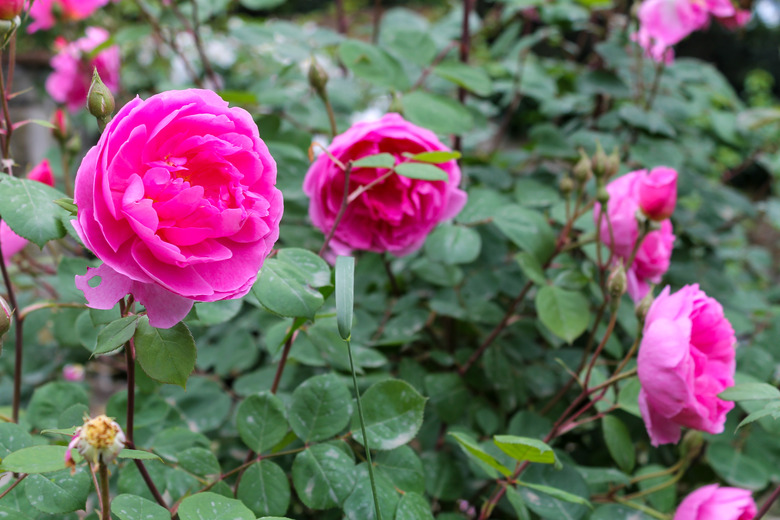Are Roses Perennials?
We may receive a commission on purchases made from links.
Perennials are plants that live for more than three years, returning each spring as the weather warms up to once again brighten the landscape. With more than 150 species, fossil evidence suggests that roses (Rosa spp.) have been in existence for more than 35 million years. While roses in the home garden won't last that long, proper site selection, planting, care and pruning will ensure that perennial roses do continue to bloom every year.
Tip
All roses are perennials in their species- and cultivar-specific hardiness zones if they are planted properly and receive the right care. There are shrub roses, which tend to be wild, old garden roses or species developed before 1867, and modern roses, which include most hybrid tea roses and grandiflora roses.
Site Selection for Roses
Site Selection for Roses
When purchasing roses for the garden, select varieties that are hardy to the U.S. Department of Agriculture plant hardiness zone for your area. Roses need full sun, well-drained soil and good air circulation.
Morning sun is beneficial as it helps to dry the leaves and prevent possible diseases that take hold in moist conditions, and some afternoon shade will prolong the quality of the blooms. Roses will adapt to most soil types but prefer a fertile spot.
When planting, enhance the area with organic material like compost or manure to increase the soil quality. The ideal soil pH for roses is 6.0 to 7.0; ensure the bed is properly prepared before planting.
Planting Your Rose
Planting Your Rose
Dig the hole deep and wide enough to accommodate plant roots, keeping the bud union level with the soil. Place the plant in the hole, fill two-thirds with soil, and add water, creating a muddy mix that gets through the roots. After the water has drained, add more soil and repeat the mud process until reaching the original soil level.
Fertilizing Rose Plants
Fertilizing Rose Plants
Roses need 1 inch of water per week, and sandy soil and dry spells will require an increased watering frequency. Soaker hoses are ideal for roses because they deliver consistent moisture while keeping the leaves dry.
Fertilize roses according to soil-test recommendations. This may be as easy as applying a 10-10-10 fertilizer early in the season and again in mid-June, surrounding the plant 6 inches out. For roses that bloom repeatedly, you may need to apply fertilizer again lightly in the middle of July, but do not apply any more after mid-August as it may promote growth that will not survive the winter.
Winter Care of Roses
Winter Care of Roses
Keeping roses consistently cold and frozen rather than experiencing freezing and thawing numerous times is key to winter survival. As winter approaches, mound roses with 12 inches of a soil/compost mix, pruning any tall plants to prevent stem damage.
Once the mound freezes, cover with evergreen cuttings or straw to help insulate the plant. A rose that goes into winter healthy has a good chance of coming out of the winter healthy so good summer care is essential.
Prune Your Roses
Prune Your Roses
Pruning needs vary for roses. Most should be pruned in the spring, about the time you see forsythias begin to bloom. For modern roses, remove all dead canes. For shrub roses, remove one-third of the oldest canes. For old garden roses, thin and remove old wood. For climbing roses, prune in early spring by cutting back side shoots to 3 to 6 inches.
Pruning requirements vary depending on the type of rose, but all roses share the same pruning basics. Use clean, sharp pruners and cut at a 45-degree angle.
Remove all dead wood or any canes that are thin, not growing well or weak, and deadhead any spent flowers at an outward-facing bud above a group of five or seven leaflets.
